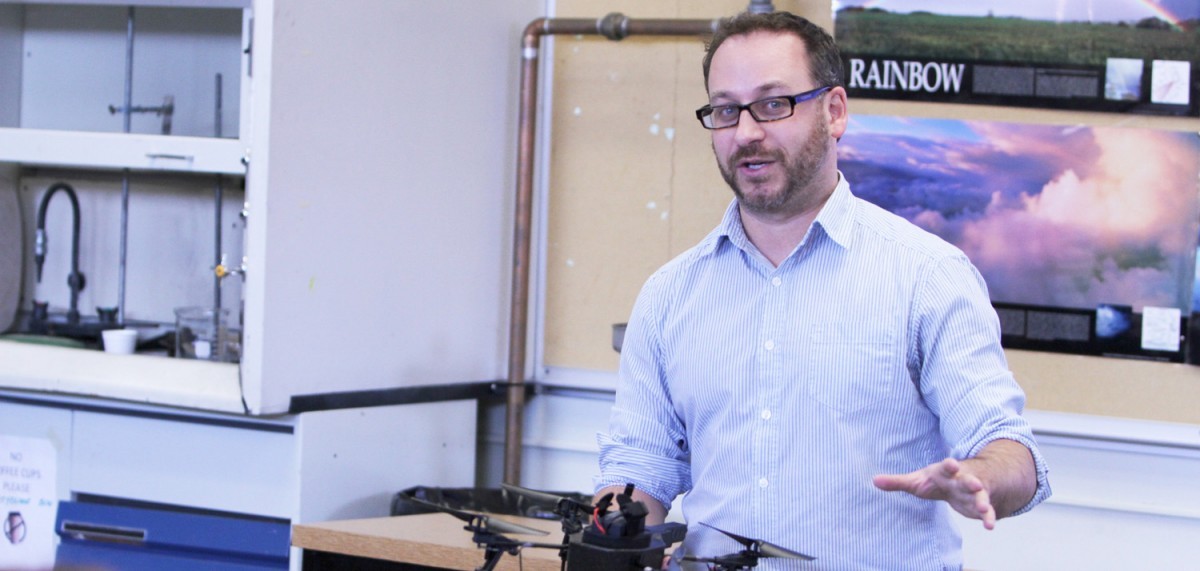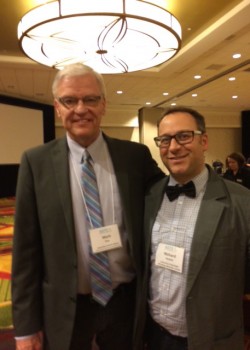
Dr. Richard Hechter will receive his fellowship at the Society for Information Technology and Teacher Education conference this spring.
Education professor honoured for innovative science teaching concept
Richard Hechter received a fellowship from the National Technology Research Initiative

UND professor Mark Guy with U of M Education professor Richard Hechter after they won the NTLI Fellowship.
Richard Hechter, an associate professor in the Faculty of Education, has recently been honoured for a project in which elementary school science teacher candidates are asked to create short movies about scientific concepts to be shown to students.
Hechter and co-winner Mark Guy, an associate professor of education at the University of North Dakota and Hechter’s former advisor, were presented with a fellowship from the National Technology Leadership Initiative (NTLI) for their work on the innovative project.
Both professors were surprised to receive the fellowship while attending a luncheon at the Association for Science Teacher Education (ASTE) conference in Portland, Ore., held Jan. 7-10.
Hechter said he had submitted two papers at this year’s conference, but expected to be a serious contender for the fellowship next year. Instead, the two found themselves accepting the award this year. The fellowship recognizes “an exemplary presentation on technology.”
“This [project] is really the connection between science education and technology use or technology use in science education. So, it’s nice to be recognized for this,” says Hechter of the honour.
He and Guy will be headed to the Society for Information Technology and Teacher Education (SITE) conference this spring in Las Vegas, where they will present at a symposium and receive an award plaque; along with receiving $1,200 for travel expenses and complementary conference registration. The SITE group chooses one NTLI fellowship winner in each of four areas—science, math, English language arts and social studies education—to present at their conference.
For the past seven years, Hechter and Guy have been introducing the innovative project to early years bachelor of education students at UND. Over the course of six weeks, students work— from storyboard to final production—on short films about scientific concepts from their elementary curriculum. Hechter’s role is on the conceptualization of the project but the actual videos are created by education students at UND.
“What they do is make movies in collaborative groups to show either explaining a concept or to engage students in that concept,” says Hechter.
What sorts of ideas do they explore? Everything from films about gravity to density to weather to the life cycle of a tree, says Hechter. And students use all sorts of creative ways of storytelling, from Claymation to voiceovers to songs or performances.
When the project began, every student was required to use the same technology: camcorders, FireWire and iMovie. Now, they are allowed to use whatever technology they want: from smartphones to camcorders to webcams.
Hechter says every year, the technology and the quality of the videos improve. One reason he feels that he and Guy won the fellowship is that the project is constantly changing and growing.
“Part of why we won this award is that we have made ourselves vulnerable by talking about how this project has evolved over time. We were not content to give the same activity every year in the same way.”
At the end of the project, students hold a movie showcase day where they screen the films and discuss the difficulties or successes they had while making them. What comes out of those discussions are various perspectives on teaching science itself, says Hechter.
Hechter and Guy are also following some of the teacher candidates as an ongoing research project. Once the candidates begin their own science teaching careers, are they inspiring their students to do science concept films?
“The hope is, that they will then take that to their own classroom,” Hechter says. And he says many are doing so.
Hechter’s current research includes studying the aurora borealis in Northern Manitoba and other northern climates, along with physics education and educational technologies in science education.







It is a privilege to work with colleagues who combine passion, content knowledge, pedagogical innovation, and research in their efforts to promote engaged learning and enhanced scholarship. Congratulations!